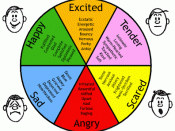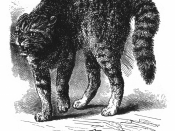The power of emotion is illustrated in literature. The control that one's emotions have over that person is so strong that they will usually take precedence over his common sense and logical reasoning. It is rare that a character will find himself in a situation where he is not emotionally inclined toward a particular group, cause, or another character. These emotions hinder his ability to think as rationally and logically as he otherwise would. The character's judgments, decisions, and actions are therefore not a result of clear thinking, but of his personal sentiments. Characters tend to act upon feelings of anger, hatred, affection, and jealousy rather than reason. Although in life having one's emotions motivate a person's actions will probably bring about unpleasant endings, in literature it provides interesting twists in the story's plot.
Edgar Allen Poe's short story, "The Cask of Amontillado," provides the prime example of how literary characters' emotions compel their actions.
Poe uses feeling of pride, jealousy, and revenge to convey this idea in his story. Poe does not specify what Fortunato had done to offend Montresor, suggesting that it was something insignificant, and surely not deserving a punishment as severe as death. Additionally, the fact that Fortunato followed Montresor willingly into his dungeon and was in no way wary of him shows that whatever Fortunato had done to Montresor he must have deemed trivial.
Consequently, having shown that the crime committed was something small and petty, the only thing that sparked Montresor's unmerciful revenge was his feeling of self-pride. Logically, it does not make sense to kill someone over an insignificant incident, but Montresor had such an extreme feeling of pride for himself and for his family name that it drove him to murdering Fortunato in order to uphold it. He...


